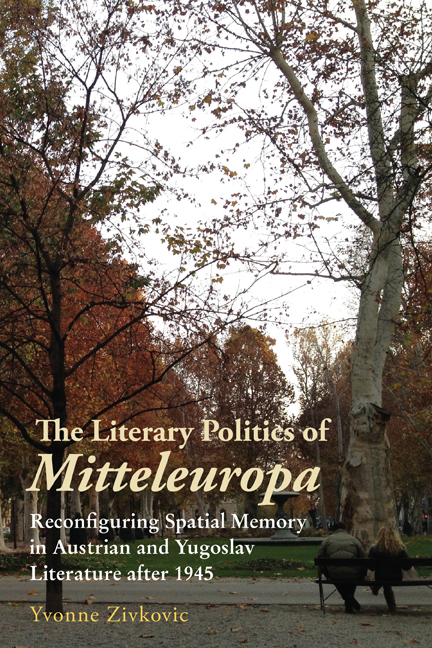 The Literary Politics of Mitteleuropa
The Literary Politics of Mitteleuropa Book contents
- Frontmatter
- Contents
- Acknowledgments
- Abbreviations and Note on Translations
- Introduction: Mitteleuropa as a Transnational Memory Discourse
- 1 The Legacy of Mitteleuropa: Between Geopolitics and Geopoetics
- 2 Ingeborg Bachmann and Peter Handke: The Austrian Mitteleuropa
- 3 Mitteleuropa as Conflicted Community in the Writings of Danilo Kiš and Aleksandar Tišma
- 4 Mitteleuropa after 1989: New Memory Challenges in Christoph Ransmayr and Dubravka Ugrešić
- Conclusion: Mitteleuropa Literature in the Twenty-First Century: Revisiting the Promise of Border-Crossing
- Bibliography
- Index
2 - Ingeborg Bachmann and Peter Handke: The Austrian Mitteleuropa
Published online by Cambridge University Press: 23 March 2021
- Frontmatter
- Contents
- Acknowledgments
- Abbreviations and Note on Translations
- Introduction: Mitteleuropa as a Transnational Memory Discourse
- 1 The Legacy of Mitteleuropa: Between Geopolitics and Geopoetics
- 2 Ingeborg Bachmann and Peter Handke: The Austrian Mitteleuropa
- 3 Mitteleuropa as Conflicted Community in the Writings of Danilo Kiš and Aleksandar Tišma
- 4 Mitteleuropa after 1989: New Memory Challenges in Christoph Ransmayr and Dubravka Ugrešić
- Conclusion: Mitteleuropa Literature in the Twenty-First Century: Revisiting the Promise of Border-Crossing
- Bibliography
- Index
Summary
THE MITTELEUROPA THAT Jewish-Austrian writers such as Stefan Zweig and Joseph Roth had presented as a nostalgic, albeit already disintegrating spatial imaginary and hybrid cultural network attained a new meaning for the first generation of Austrian writers after 1945. Austrian writers like Ingeborg Bachmann and Peter Handke, who were adolescents or children during the Second World War, were faced with a different coming to terms with the past than their parents, making their process of self-positioning more complex. Their conflicts with memory practices, both regarding the recent National-Socialist period (which Bachmann had witnessed in her youth), as well as regarding the larger-than-life Habsburg era, were complicated by personal family histories: Bachmann's father, Matthias Bachmann, had joined the NSDAP already in 1933, long before Hitler's annexation of Austria in 1938; while Handke's biological father was the German Wehrmacht soldier Erich Schönemann, stationed in Carinthia during the Second World War. Bachmann's and Handke's literary engagement with their familial entanglements in Austrian complicity resulted in a continuous balancing act between the affirmation of a multiethnic, transnational Austrian identity and the deconstruction and renegotiation of the stifling parameters of nationhood that had paved the way for Austria's association with fascism. Their upbringing in multilingual and pluricultural Carinthia, which shares borders with Italy and Slovenia and hosts a sizeable Slovenian minority, instilled them with an awareness of diversity that is difficult to reconcile with Nationalist-Socialist policies of ethnic purity.
The cultural exchange with its Southeastern neighbors also made it a contested region, vulnerable to discourses of identity politics. Carinthia was one of the regions that most fervently welcomed Hitler upon the Anschluss in 1938. For Bachmann, her father's early membership in the NSDAP, as well as her close bond to the politically compromised Carinthian “Heimatdichter” Josef Friedrich Perkonig remained a blind spot in her writing and appears in odd contrast to her early insistence on a radical confrontation with Austria's complicity in National-Socialist atrocities. Similarly, since the late 1970s Handke had emphasized his mother's Slovenian heritage in his narratives on the margin, in which repeatedly criticized the provincial and still latently fascist mindset of Carinthian village life, neglecting his German father and his German stepfather, both of whom had been Wehrmacht soldiers.
- Type
- Chapter
- Information
- The Literary Politics of MitteleuropaReconfiguring Spatial Memory in Austrian and Yugoslav Literature after 1945, pp. 81 - 162Publisher: Boydell & BrewerPrint publication year: 2021


